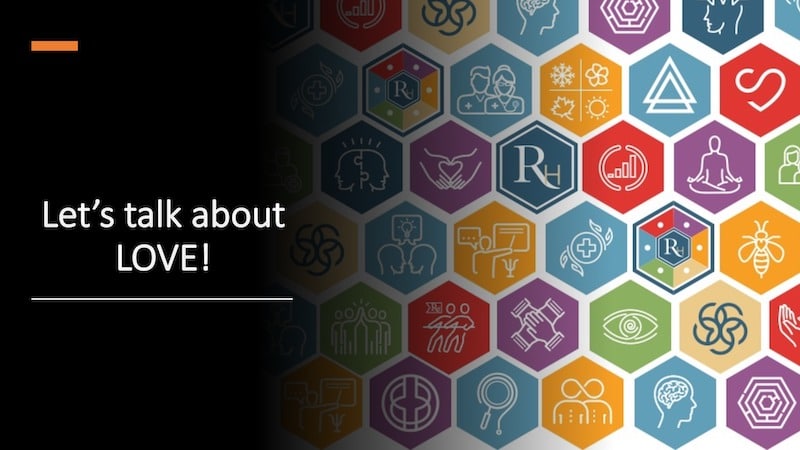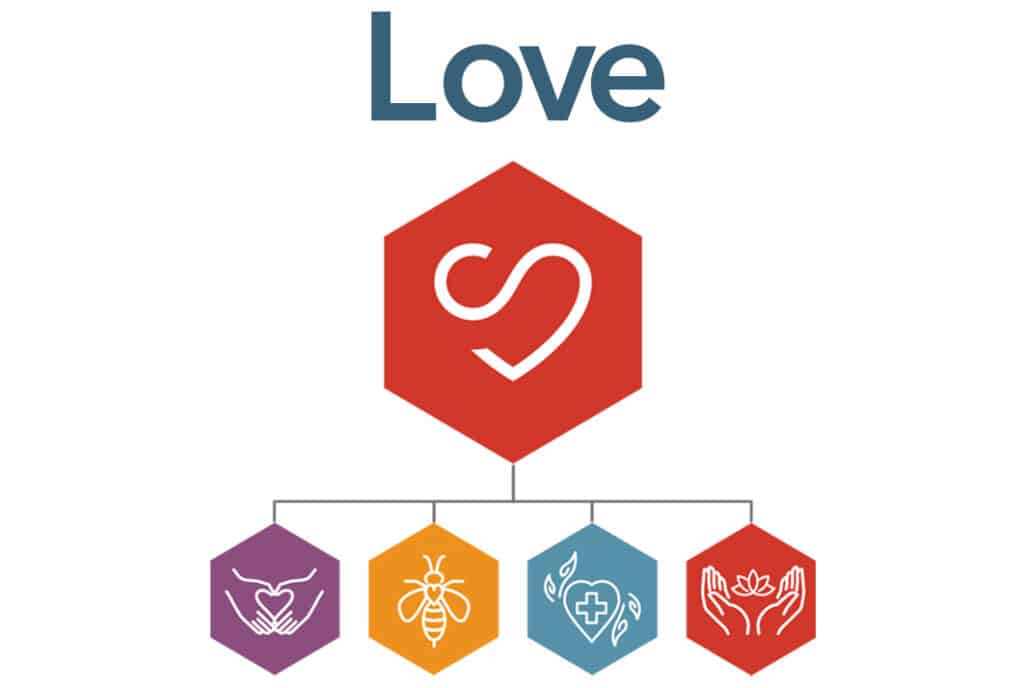Neuroplasticity and Recognizing the Importance of Love to Health & Wellness

The hatred in our country right now and around the world is more intense than many of us have ever experienced or witnessed, deepening divisions along party lines, racial and ethnic lines, socio-economic lines, borders, and any other lines that separate us according to real or perceived differences. The current focus is on race, but it’s not all about race.
Before that, the hatred was directed at the Chinese for their alleged role in releasing the coronavirus, and before that, the hatred was between democrats and republicans. Historically, we have had wars over differences in religion or world views. We continue to see growing hatred toward our President, and on the other side, hatred directed against the people who hate him.
Hatred and conflict always seem to intensify in troubled times. Fear and frustration quickly turn to anger, and we have had plenty of fear and frustration lately. The COVID-19 pandemic alone filled many of us with fear of sickness and death. Combine that with the fear and frustration of the resulting widespread economic hardship (not being able to pay the bills or support one’s family), and there is already enough to trigger protests and looting. Now add to that the racial tensions inflamed by the senseless killings of George Floyd in Minneapolis, Minn.; Ahmaud Arbery in Glynn County, Ga; and Breonna Taylor in Louisville, Ky., and the efforts by various groups to exacerbate racial discord, and you have a recipe for disaster.
During these troubled times, it is important to recognize that we have a choice. We can choose hatred or love. We can choose to focus on problems or solutions. We can choose to focus on what we share in common or how we differ. Whenever we deal with a crisis at any level — at the relationship, family, community, state, national, or international level — how we choose to respond to challenges either drives us apart or draws us closer together. It weakens or strengthens the collective — the individual, the couple, the family, the community, the country, the world, and our individual and collective immune systems.
Ideally, when we have differences of opinion, we can all act as mature, evolved adults. The recent peaceful protests exemplify how mature human beings can express their concerns and harness the emotional power of their frustrations to drive requests for positive change. This sort of social discord can be a constructive discord emblematic of growing pains. It is healthy and enables us to evolve as a society. Riots, looting, and other forms of destructive social discord, on the other hand, cause indiscriminate harm and deepen the divisions among us.
Here at Restoration Healthcare, we are disturbed by the fear, frustration, injustice, violence, and destruction we are seeing across California, our country, and around the world. In the context of healthcare, our concerns are focused on how the current conditions are impacting our patients’ health and wellbeing. Our focus is on whole health and how that relates to each and every patient. Whole health includes mind and body, relationships, social interactions, emotions, beliefs, and behaviors — how we think, act, and treat others, whether they’re friends and family members, coworkers, neighbors, or complete strangers.
We Choose Love
At Restoration Healthcare, we have built our practice on the foundation of six core values: Accountability, Connection, Rhythm, Curiosity, Wisdom, and Love. Compassion for our patients and passion for our work are the driving forces behind our dedication to delivering exceptional healthcare in a kind and caring manner, as illustrated in the graphic below.
This graphic contains five icons that illustrate just part of our treatment philosophy:
- Love icon: At the top of the graphic is the Love icon, a combination of the infinity sign and a human heart, which represents the eternal love and passion for our profession and the lasting relationships we form with our patients. It is red to convey our passion, desire, and love.
- Client compassion icon: The icon in the lower left shows a pair of hands forming the shape of a heart, which symbolizes a compassionate “love you” and “thank you” to our patients. It is violet to represent sensitivity, compassion, and intuitiveness.
- Work drive icon: The dedicated and busy worker bee represents a commitment to our patients and our passion for optimizing their health and wellbeing. It is gold to convey a sense of happiness, optimism, and hope. In addition, yellow produces a warming effect, generates muscle energy, arouses cheerfulness, and stimulates mental activity.
- Exceptional healthcare icon: This design features a heart representing compassion, centered with the internationally recognized medical cross, and flanked on two sides by organic leaves — symbolic of alternative medicines. The blue, which is often associated with healthcare, represents trust and conveys healthiness, healing, tranquility, understanding, and softness.
- Kind and caring icon: These open hands offering a lotus flower symbolize forgiveness, gratitude, and compassion, inviting a balance between humility and pride. The icon is red to convey a sense of loving generosity — a sharing of life’s abundance.
We Encourage Love and Mutual Acceptance and Understanding
During these times of intense turmoil, we have to become even more conscious of the importance of nurturing healthy brains and mindsets. All of us, healthcare providers and patients, are already well aware of the negative impact that emotional stress can have on our health, and as Functional Medicine practitioners, we are always digging deeper to find the root cause of what ails us. In the case of emotional stress, we seek to identify and address the root causes of that stress, which can often be traced back to events, living conditions, relationship issues, and other external factors and how we perceive them and choose to think about them and respond to them.
Sometimes our brains can be our own worst enemies. They can make assumptions that lead to irrational conclusions. They can be conditioned to form certain biases. They can conform to harmful thought patterns we were taught or that we developed over the course of our lives. Our brains can also be susceptible to the information and opinions we are exposed to, which can lead to acceptance of false beliefs and harmful opinions. When this occurs among large populations, a sort of social sickness ensues.
Now’s the Time to Take Conscious Control
In the midst of life’s disruptions and conflicts, it is important for all of us to spend some time taking a personal inventory and evaluating our thinking and behaviors objectively. More and more scientific studies reveal theneuroplasticity of the brain — the ability of the brain to form new neural connections across synapses as we learn, and our thinking evolves. These new neural connections influence the way we think and behave, so it’s important that we take conscious control of this process, so the world around us doesn’t dictate what we think, how we feel, and how we behave. In the world of psychological this is labeled as integration, which according to the Swiss psychiatrist and psychoanalyst, Carl Jung, is the process during which both the individual and collective unconscious are integrated into the personality. Integration is a positive psychological development that indicates psychological maturity and may help us move past negative habits.
We encourage you to take the time to assess your way of thinking and your beliefs and to carefully filter what you allow your brain to consume and your heart to emit. Specifically, we recommend:
- Being critically skeptical of the information you see and hear on the news
- Same with what you see posted on social media services you choose to use
- Try to obtain information from a wide variety of sources, so you can view issues from different perspectives.
- Whenever you disagree with a person or opinion, try to understand how the other person perceives the situation or the issue and the reasoning and experiences that have given rise to their opinions.
- Carry on constructive dialog with the intent to resolve disagreements and solve problems instead of just trying to convince someone why you’re right and they’re wrong.
- Remember that even when we disagree with one another, we can usually find some common ground on which to start a constructive dialog.
Neuroplasticity enables us to eliminate false assumptions and develop cognitive abilities to perceive one another through a lens of greater tolerance and acceptance. As more and more of us develop unbiased, rational thinking, we increase our ability to resolve disagreements and solve problems collaboratively. We start moving in the same direction and working together to further our progress on every level. In the process, we benefit as human beings, developing healthy minds that support healthy bodies and increase our happiness and fulfillment.
Keep in mind (pun intended) that this process takes time. Repeated exposure over time creates a new pathway. It’s like learning a new skill, such as golf, where the basic fundamentals are naturally developed through exposure and practice, and where recognizing bad patterns and replacing them with new ones — over and over again — improves your handicap. Don’t get frustrated. Any movement towards a new attitude should be celebrated.
And it all begins with love — self-love, genuine love and caring for the health and wellbeing of others, and a passion for being and doing our very best.


